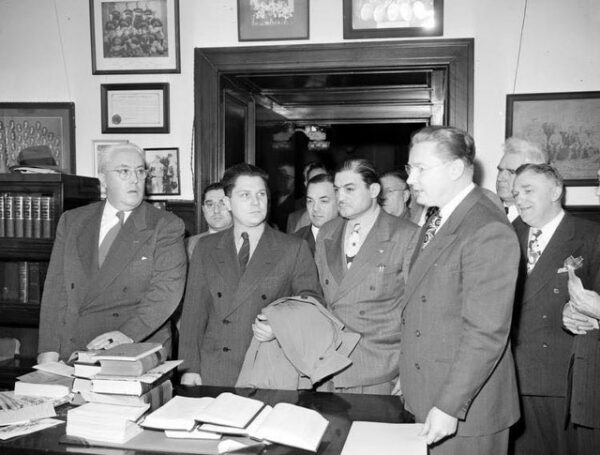Only July 30, 1975, the famous, or infamous, leader of the Teamsters Union went to the Machus Red Fox Restaurant in suburban Detroit for dinner and was never seen again.
“James Riddle Hoffa was one of America’s foremost labor organizers, known for his leadership of the International Brotherhood of Teamsters, the corruption charges he faced, and for his mysterious disappearance, writes The Detroit Historical Society. “Hoffa was born into a Brazil, Indiana coal-mining family on February 14, 1913. When Hoffa was seven, his father died of work-related conditions and in 1924 the family moved to Detroit’s west side. Hoffa dropped out of school and went to work in a Kroger grocery warehouse. Spurred on perhaps by the memory of his father’s death, Hoffa rallied the workers around poor working conditions and unfair treatment, and when he called his first strike, he won.
Soon Hoffa was organizing for the International Brotherhood of Teamsters, which elected him president in 1957, a position he held until 1971. In 1964 he negotiated the National Master Freight Agreement, which covered over 450,000 truck drivers and was described as “a milestone for labor unions everywhere.” It was followed by similar pacts for other trades and crafts within the Teamsters union and while Hoffa was president, the membership grew to the largest of any union in the U.S.
Hoffa had Mafia connections and made transactions that brought him under federal scrutiny. He was eventually convicted in 1964 on jury tampering, attempted bribery, and fraud. President Richard Nixon pardoned him in 1971, stipulating that he avoid any further union activity until 1980.”
No one knows for sure what happened to Jimmy, but most suspect that he was kidnapped and murdered by the mafia for trying to reclaim his powerful union position in 1975.
What we do know is that on July 30, 1975, Hoffa left his home in Lake Orion, Michigan, around 1 p.m. and made a stop to visit a friend in Pontiac. He arrived around 2 p.m. at the Machus Red Fox restaurant in Oakland County’s Bloomfield Township to meet reputed Detroit mob enforcer Anthony “Tony Jack” Giacalone and alleged New Jersey mob figure Anthony “Tony Pro” Provenzano. Hoffa called his wife, Josephine, about 2:15 p.m. from a pay phone and told her no one showed up for his meeting. He told her he would be home at 4:00 p.m. and to grill steaks for dinner.
Several witnesses saw Hoffa standing by his car and pacing the restaurant’s parking lot. Two men saw Hoffa, recognized him, and stopped to chat with him briefly and to shake his hand. The FBI estimates that Hoffa left the location without a struggle around 2:45 p.m. One witness reported seeing Hoffa in the back of a maroon Lincoln or Mercury car with three other people.
Throughout the decades-long investigation into the mysterious disappearance of Jimmy Hoffa, multiple theories have emerged, each adding a layer of intrigue and complexity to the enigmatic tale. As the former Teamsters president vanished without a trace on that fateful day in July 1975, a myriad of speculations arose regarding his final resting place.
Some believed that Hoffa’s fate was intertwined with the construction of Giant Stadium in New Jersey. Whispers spread that he was entombed beneath the mammoth concrete structure, a grim secret concealed within its very foundation. Despite thorough searches and extensive excavations, no tangible evidence emerged to validate this theory.
Others have argued that Hoffa’s remains were hidden in the vast expanse of Michigan, with some pointing to remote farms and fields. Searches of some fields near the restaurant where he was last seen turned up nothing.
Another thought involves the swamps of the Florida Everglades. Some believe that Hoffa’s body was transported south and unceremoniously dumped within the untamed wilderness.
The rumor mill has long churned with stories of Hoffa’s body being incinerated at a mob-affiliated funeral home or submerged in a barrel of concrete and dumped into the ocean.
As the years turned into decades, the theories surrounding Jimmy Hoffa’s whereabouts have continued without the FBI and other investigators finding proof of his final resting place.
In 2019, an author studying the case said the FBI know who killed Hoffa, but won’t release the name because it would undermine other investigations and informants.



